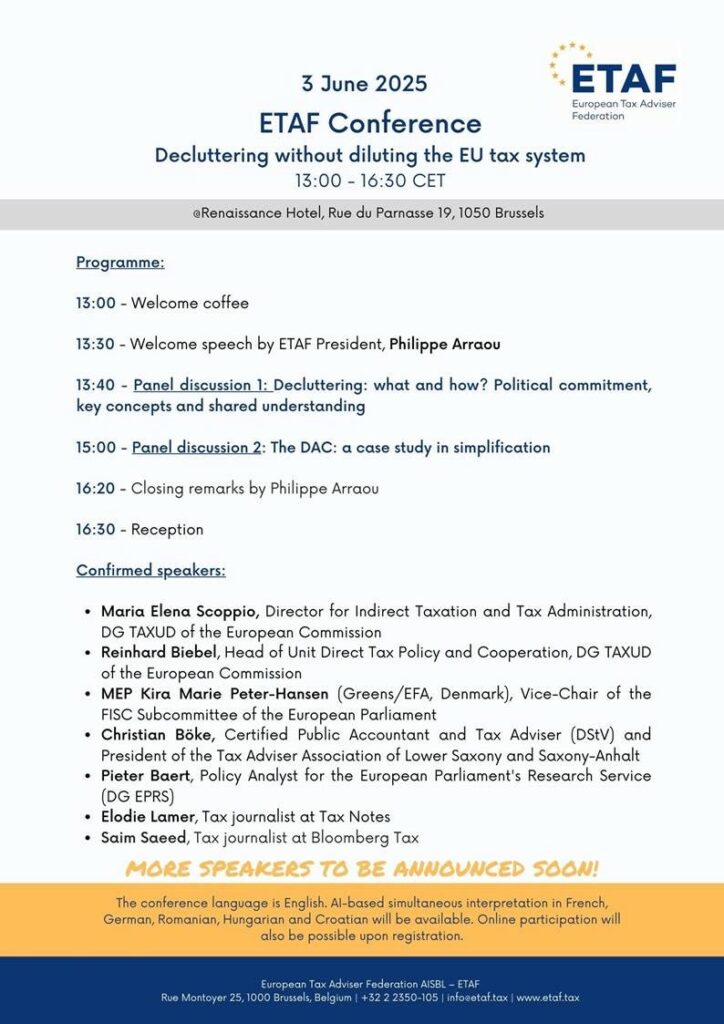FISC Subcommittee to examine import VAT fraud, the EU anti-avoidance framework and global tax governance
The FISC Subcommittee will welcome the European Court of Auditors (ECA) on 14 May 2025 to present its Special Report 08/2025: "Value Added Tax fraud on imports - The EU's financial interests are insufficiently protected under simplified import customs procedures" in a joint meeting with the CONT Committee. The following day, the FISC Subcommittee will host a public hearing on “The future of EU anti-avoidance tax rules, including simplification”. This hearing will take stock of the EU's progress in tackling corporate tax evasion and avoidance, with a particular focus on the EU anti-avoidance framework – particularly the Anti-Tax Avoidance Directives (ATAD I & II). It will explore how the current framework can be modernised to better reflect today's economic realities, technological developments, and the administrative needs of Member States, including updates on key legislative initiatives such as the Unshell proposal. Additionally, the hearing will emphasise the need to simplify and harmonise EU anti-avoidance rules to reduce complexity, enhance legal certainty, and ease compliance for both businesses and tax administrations. Following this discussion, the FISC Subcommittee will then shift its focus to the broader international tax landscape with a session dedicated to "Implementing the Two-Pillar Framework: international developments and the state of EU-US relations." The hearing will assess the implications for the EU's approach to global tax governance and explore the implementation of the OECD's 2-Pillar framework in regard to the change of government in the United States. Furthermore, the discussion will examine how these developments influence ongoing tax negotiations at the UN level.
Main results from the High-Level Working Party on Tax Questions meeting on 29 April
The High-Level Working Party (HLWP) on Tax Questions within the Council met on 29 April 2025. The agenda included several international tax matters. Member States experts held an exchange of views on the United Nations negotiations on a Framework Convention on international tax cooperation and on the way forward for the Global Minimum Tax. Furthermore, they received information from the Polish Presidency of the Council on the OECD/G20 Inclusive Framework on BEPS. Regarding domestic tax topics, a presentation by the Presidency and an exchange of views on a “structured approach for tax decluttering and simplification” were held. Moreover, tax experts prepared a general approach on the Directive on VAT rules for distance sales of imported goods and import VAT for the May ECOFIN Council, as well as exchange views on the way forward on the Directive on Transfer Pricing. In preparation for the meeting on 29 April, the Polish Presidency held an informal meeting of the High-Level Working Party on Tax Questions in Wrocław from 23–25 April 2025. Key topics included challenges in digital trade, the growing number of imports from third countries, e-commerce taxation, and the role of behavioural economics in improving tax compliance. The meeting brought together representatives from the Polish Ministry of Finance, the European Commission, the European Court of Auditors, and EU Member States.
Major VAT import fraud scheme uncovered by OLAF and Polish authorities
Close cooperation between the European Anti-Fraud Office (OLAF) and fiscal authorities in Poland, Germany, Czechia, Lithuania, and Latvia has led to the uncovering of a sophisticated VAT fraud scheme involving goods imported from China into the European Union. OLAF identified a complex network exploiting the so-called "customs procedure 42"—a mechanism that allows for deferred VAT payments on goods imported into one Member State and transported to another. The suspected fraudsters transported goods arriving from China via railway border crossings into Germany under a customs transit procedure, suspending customs duties and VAT. Once in Germany, the goods were declared under procedure 42, only to be transported back to Poland. The fraudulent activities were orchestrated by an organised group, operating behind a network of shell companies. Following OLAF’s referral, the Regional Prosecutor's Office in Kraków launched a criminal investigation leading to an extensive enforcement operation. The authorities arrested four individuals and seized telephones, computers, data carriers, financial and accounting documentation, and almost 300 company stamps. The detainees have been charged with participation in an organised criminal group, money laundering, and falsification of legal documents.
CJEU - State aid: the Court specifies the circumstances in which tax exemptions may be prohibited by EU law
In its judgment of 29 April 2025, the Court of Justice of the EU delivered its judgment in Case C-453/23 (Prezydent Miasta Mielca), addressing whether a Polish property tax exemption constitutes prohibited State aid under EU law. The case concerned a company that made its railway siding available to rail carriers to qualify for a tax exemption under Polish law. Despite fulfilling all legal conditions, the exemption was denied on the basis that it could amount to unlawful State aid since it had not been notified to the European Commission. The CJEU held that, in principle, a general and abstract tax exemption like the one in question does not amount to State aid. Such exemptions are not selective if they apply broadly across sectors, are based on neutral criteria, and serve legitimate public policy goals—here, both budgetary and environmental. The Court emphasized that the exemption must not be linked to the specific characteristics of certain undertakings, nor be part of a discriminatory tax regime. However, the Court also clarified that it is for the national court to determine whether the exemption is indeed selective in practice. If it is found to be selective, the court must also assess whether it distorts or threatens to distort competition within the internal market. The judgment provides important guidance on how tax exemptions should be assessed in the context of EU State aid rules.
ETAF Conference on 3 June 2025 in Brussels: registration opens
Register here:
https://sweapevent.com/etafconferencedeclutteringwithoutdilutingtheeutaxsystem

